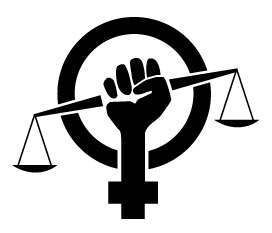The Law Programme lacks a perspective of normative criticism. This is what Caroline Beck-Friis and Hanna Rosqvist claim, both active in the newly established association Feministiska Juriststudenter Lund.
“That something is written on paper does not mean that it is being done in practice”, Caroline Beck-Friis says.
At prestigious Juridicum in Lund, the lawyers and judges of the future are being educated, but without being taught normative criticism. At least according to Hanna Rosqvist and Caroline Beck-Friis, chairperson and treasurer at the newly established association Feministiska Juriststudenter.
“There is an equality plan on paper, but that isn’t noticeable in the education. We had a lecture with focus on gender during term one, but that wasn’t connected to law at all. We want to introduce a perspective of normative criticism to the education; it shouldn’t be seen as a special area as it is today”, Hanna Rosqvist says.
A lack of knowledge among lecturers
The idea is to, among other things, invite external lecturers with expertise in various areas regarding issues of gender and normative criticism. And they have been well received by their fellow students.
“There is much interest for these questions. When we graduate, we want this knowledge so that we can use it in our professional roles. Today, our lecturers don’t have that knowledge, they just don’t have that competence.”
Does not reflect society
Even the faculty have been listening to what they have to say, Hanna Rosqvist explains.
“We have established ourselves as an independent association but would happily cooperate and have a dialogue with them. They have stated that they are open to listening to what we have to say.”
Can you give an example of what you are critical towards in the current education?
“At a seminar a week ago, we had been given a text to discuss that was about the representation of women. The leader of the seminar plainly said that he didn’t have any knowledge in these issues and that we were free to discuss it on our own. So the text had been chosen just because, and then he says: you are free to discuss this because I am not familiar with this”, Caroline Beck-Friis explains.
“It is problematic that the seminar leader doesn’t have any knowledge of the text we are supposed to read. These questions are not discussed at lectures, and the students are expected to have knowledge in them, while the lecturers aren’t”, Hanna Rosqvist holds.
Why is it important to have a gender perspective and an approach of normative criticism at the Law Programme?
“The norm in our course literature is a white, straight, middle class man without disability. That doesn’t reflect the general society or what we want to learn. This is important since many law students will be found in positions of power later in life. If we don’t have knowledge in these issues, that could have huge consequences”, Hanna Rosqvist says.
“You are urged to think critically within certain boundaries, but if you overstep those, it becomes too much”, Caroline Beck-Friis adds.
More has to be done
Hanna Rosqvist and Caroline Beck-Friis hold that there are some lecturers dedicated to these issues, but you are lucky if you get one of them.
They are positive towards the latest report, but believe that it is not enough.
“Start with prioritising these issues, we won’t give up, we are here to stay.”
- READ MORE: All Is Well on Paper
 Feministiska Juriststudenter Lund
Feministiska Juriststudenter Lund
Purpose:
- Promote norm criticism and an intersectional gender perspective at Lund University’s Faculty of Law.
- Promote an inclusive study climate at Lund University’s Faculty of Law.
- Educate ourselves on feminism and norm criticism.
- Provide discussion forums for these subjects.
- Feministiska Juriststudenter also exists at the universities in Gothenburg and Uppsala.
Text: Karolina Jakstrand
Translation: Carl-William Ersgård






